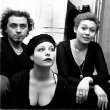|
|

XVII° Vie The release of the first solo EP of the XVII° Vie's singer, Karin Mérat, leads us to the story of this disturbing and fascinating group. The career of XVII° Vie begins roughly in 1988, with the name Derniers Chemins d'Automne. The trio (Karin: vocals, drums, Franck: guitar, keyboards, Michel: voice, guitar) is quickly renamed XVII° Vie and release a few songs, very minimalistic and dark, with the two tapes Past Isn't Dead in 1994 (self-produced) and L'Etoile Oubliée in 1995 (by the label Prikosnovénie). These songs have been re-issued on CD in 1997 as Past Isn't Dead : 1988-1994. A magnificent object, it's a CD collection limited to 500 copies, wrapped up in a home-made marble paper. We can find the first songs nearly experimental, very short (Derniers Chemins d'Automne, Prélude, Receive, Final), with bells (The Voice), and guitars (Essai). We also find the first structured songs, sung by Karin (No More, Ultimatum, Spirit's Skin), instrumental (Solstice) or Polish related poems by Michel (To Chyba Wszystko), and one of the best tracks with Cocteau Hommage, close to the delightful music of Cocteau Twins (from their 4AD period). Let's leave these initial facts and go on to the first album of XVII°, Vie La Prana released in 1996 (Prikosnovénie). It has finely-shaded sounds and shows the growing maturity of the group. The influence of Cocteau Twins is omnipresent (their best period of Treasure and Victorialand), in particular with the crystal-clear guitar sounds: Les Elfes de la Lumière, L'étoile Oubliée, Spirit's Skin, Hôh, Cobalt, Faust, and especially Frozen Legend, which is of remarkable beauty and mastery, worthy of comparison to the most excellent Cocteau Twins. However, the comparison stops here, because Karin's voice is very different. As for the use of percussions, they sometimes remind me of the first albums of In The Nursery. We can also hear Michel's voice, in some Polish poems: Totentanz, To Chyba Wszystko (still best, recorded here with female chorus), Na Zawsze, Psaume, and some thoughtful (Ultimatum), indeed solemn (Fetish) or medieval (Lorna) songs. Striking contrast with the second album Llewella, very acoustic, released (Prikosnovénie) in 1997. Musically perfect, gaining in maturity and elegance, with a magnificent cover design, drawed by Anastasia. She plays violin on all the songs, with a sound now melancholic (La Valse des Korrigans, very close to Dead Can Dance), now powerful and worrying (Llewella). This album begins and ends with ballads about the sea(Flux, Reflux). It takes us to a mystic and imaginary land, first gently with Repitissa, Serena, L'Enchanteresse (very serene), Mana. Then, the percussions come back with Phalene, Anaka (hammering!), Llewella and especially Cybel, whose relative quietness in the beginning is quite misleading. This eventful travel ends with the instrumental La Marche vers Broceliande and Reflux. Then, the fairy Morgane shoots up from the sea ... In 1997 XVII° Vie recorded one song for the compilation Heavently Voices Part IV. Copyright © 1998 Patrick Dubail
|
| © 2011 Luna Kafé |